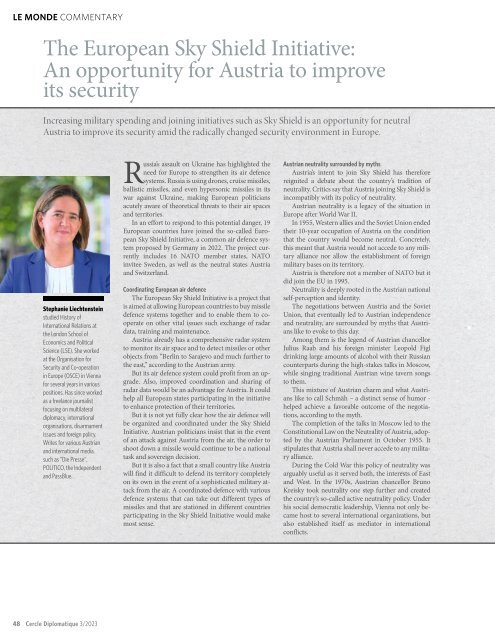CERCLE DIPLOMATIQUE - issue 03/2023
CD is an independent and impartial magazine and is the medium of communication between foreign representatives of international and UN-organisations based in Vienna and the Austrian political classes, business, culture and tourism. CD features up-to-date information about and for the diplomatic corps, international organisations, society, politics, business, tourism, fashion and culture. Furthermore CD introduces the new ambassadors in Austria and informs about designations, awards and top-events. Interviews with leading personalities, country reports from all over the world and the presentation of Austria as a host country complement the wide range oft he magazine.
CD is an independent and impartial magazine and is the medium of communication between foreign representatives of international and UN-organisations based in Vienna and the Austrian political classes, business, culture and tourism. CD features up-to-date information about and for the diplomatic corps, international organisations, society, politics, business, tourism, fashion and culture. Furthermore CD introduces the new ambassadors in Austria and informs about designations, awards and top-events. Interviews with leading personalities, country reports from all over the world and the presentation of Austria as a host country complement the wide range oft he magazine.
Create successful ePaper yourself
Turn your PDF publications into a flip-book with our unique Google optimized e-Paper software.
LE MONDE COMMENTARY<br />
The European Sky Shield Initiative:<br />
An opportunity for Austria to improve<br />
its security<br />
Text: Stephanie Liechtenstein<br />
Increasing military spending and joining initiatives such as Sky Shield is an opportunity for neutral<br />
Austria to improve its security amid the radically changed security environment in Europe.<br />
Stephanie Liechtenstein<br />
studied History of<br />
International Relations at<br />
the London School of<br />
Economics and Political<br />
Science (LSE). She worked<br />
at the Organisation for<br />
Security and Co-operation<br />
in Europe (OSCE) in Vienna<br />
for several years in various<br />
positions. Has since worked<br />
as a freelance journalist<br />
focusing on multilateral<br />
diplomacy, international<br />
organisations, disarmament<br />
<strong>issue</strong>s and foreign policy.<br />
Writes for various Austrian<br />
and international media,<br />
such as “Die Presse“,<br />
POLITICO, the Independent<br />
and PassBlue.<br />
Russia’s assault on Ukraine has highlighted the<br />
need for Europe to strengthen its air defence<br />
systems. Russia is using drones, cruise missiles,<br />
ballistic missiles, and even hypersonic missiles in its<br />
war against Ukraine, making European politicians<br />
acutely aware of theoretical threats to their air spaces<br />
and territories.<br />
In an effort to respond to this potential danger, 19<br />
European countries have joined the so-called European<br />
Sky Shield Initiative, a common air defence system<br />
proposed by Germany in 2022. The project currently<br />
includes 16 NATO member states, NATO<br />
invitee Sweden, as well as the neutral states Austria<br />
and Switzerland.<br />
Coordinating European air defence<br />
The European Sky Shield Initiative is a project that<br />
is aimed at allowing European countries to buy missile<br />
defence systems together and to enable them to cooperate<br />
on other vital <strong>issue</strong>s such exchange of radar<br />
data, training and maintenance.<br />
Austria already has a comprehensive radar system<br />
to monitor its air space and to detect missiles or other<br />
objects from “Berlin to Sarajevo and much further to<br />
the east,” according to the Austrian army.<br />
But its air defence system could profit from an upgrade.<br />
Also, improved coordination and sharing of<br />
radar data would be an advantage for Austria. It could<br />
help all European states participating in the initiative<br />
to enhance protection of their territories.<br />
But it is not yet fully clear how the air defence will<br />
be organized and coordinated under the Sky Shield<br />
Initiative. Austrian politicians insist that in the event<br />
of an attack against Austria from the air, the order to<br />
shoot down a missile would continue to be a national<br />
task and sovereign decision.<br />
But it is also a fact that a small country like Austria<br />
will find it difficult to defend its territory completely<br />
on its own in the event of a sophisticated military attack<br />
from the air. A coordinated defence with various<br />
defence systems that can take out different types of<br />
missiles and that are stationed in different countries<br />
participating in the Sky Shield Initiative would make<br />
most sense.<br />
Austrian neutrality surrounded by myths<br />
Austria’s intent to join Sky Shield has therefore<br />
reignited a debate about the country’s tradition of<br />
neutrality. Critics say that Austria joining Sky Shield is<br />
incompatibly with its policy of neutrality.<br />
Austrian neutrality is a legacy of the situation in<br />
Europe after World War II.<br />
In 1955, Western allies and the Soviet Union ended<br />
their 10-year occupation of Austria on the condition<br />
that the country would become neutral. Concretely,<br />
this meant that Austria would not accede to any military<br />
alliance nor allow the establishment of foreign<br />
military bases on its territory.<br />
Austria is therefore not a member of NATO but it<br />
did join the EU in 1995.<br />
Neutrality is deeply rooted in the Austrian national<br />
self-perception and identity.<br />
The negotiations between Austria and the Soviet<br />
Union, that eventually led to Austrian independence<br />
and neutrality, are surrounded by myths that Austrians<br />
like to evoke to this day.<br />
Among them is the legend of Austrian chancellor<br />
Julius Raab and his foreign minister Leopold Figl<br />
drinking large amounts of alcohol with their Russian<br />
counterparts during the high-stakes talks in Moscow,<br />
while singing traditional Austrian wine tavern songs<br />
to them.<br />
This mixture of Austrian charm and what Austrians<br />
like to call Schmäh – a distinct sense of humor -<br />
helped achieve a favorable outcome of the negotiations,<br />
according to the myth.<br />
The completion of the talks in Moscow led to the<br />
Constitutional Law on the Neutrality of Austria, adopted<br />
by the Austrian Parliament in October 1955. It<br />
stipulates that Austria shall never accede to any military<br />
alliance.<br />
During the Cold War this policy of neutrality was<br />
arguably useful as it served both, the interests of East<br />
and West. In the 1970s, Austrian chancellor Bruno<br />
Kreisky took neutrality one step further and created<br />
the country’s so-called active neutrality policy. Under<br />
his social democratic leadership, Vienna not only became<br />
host to several international organizations, but<br />
also established itself as mediator in international<br />
conflicts.<br />
PHOTOS: PHILIPP HUTTER;VBS/DDPS BETTINA BERGER, HBF / PUSCH<br />
But is neutrality still going to guarantee Austria’s<br />
security today, especially in light of the changed security<br />
environment in Europe as a result of the Russian<br />
invasion of Ukraine? Or could it indeed become a security<br />
threat?<br />
It is likely that after carefully considering of some<br />
of these aspects, Austrian politicians decided to take<br />
the step and sign a declaration of intent to join Sky<br />
Shield – knowing that this would reignite a debate<br />
about Austrian neutrality.<br />
But Austrian politicians have denied that their participation<br />
would in any way undermine the country’s<br />
traditional posture of neutrality. The question whether<br />
joining Sky Shield is compatible with neutrality<br />
or not is not the main point of this commentary.<br />
The need to defend neutrality militarily<br />
The main argument here is that if Austria wants to<br />
stick to its policy of neutrality, even amid the drastically<br />
changed security environment resulting from the<br />
Russian invasion of Ukraine, this is only realistic in<br />
combination with serious investment in the country’s<br />
army and increased cooperation with other states in<br />
the context of joint initiatives, such as Sky Shield.<br />
While popular opinion in Austria is mostly grounded<br />
in the belief that neutrality will protect Austria<br />
from becoming involved in a war, the argument here<br />
is that neutrality is only going to be realistic in the future<br />
if it is combined with credible military capabilities.<br />
Because who will defend Austria in case of an attack?<br />
Only Austria itself.<br />
But the Austrian army has been financially starved<br />
for decades. The recently announced defence spending<br />
increases are not enough to improve Austria’s<br />
military capabilities to credibly defend itself against an<br />
attack from another nation.<br />
In 2022, Austria spent 2.7 billion Euros on defense,<br />
which represents 0.62 percent of the Austrian GDP. By<br />
comparison, Switzerland, a neutral country smaller<br />
than Austria but with a similar number of inhabitants,<br />
spent 5 billion Euros on defense.<br />
In Austria, very often one can sense an implicit expectation<br />
that all the other NATO countries that are<br />
bordering Austria will rush to its help in the event of<br />
war. Relying on such support has led some to describe<br />
Austria as a security free-rider.<br />
It is of course true that as a member of the EU, Austria<br />
could theoretically profit from article 42.7 of the<br />
Treaty of the European Union – the so-called mutual<br />
defence clause which stipulates that if a member of the<br />
EU is the victim of an “armed aggression on its territory”<br />
the other members have an “obligation of aid and<br />
assistance by all the means in their power.”<br />
But the means are not necessarily military in nature.<br />
And the clause also allows Austria, as well as the<br />
two other neutral EU member states Ireland and Malta,<br />
to remain neutral.<br />
So again, it’s not a very good idea to rely on the fact<br />
that other EU member states will military defend Austria,<br />
if Austria itself has made clear that it is not ready<br />
to provide this kind of military support to all others.<br />
Increasing military spending and joining initiatives<br />
such as Sky Shield is therefore one way to go forward<br />
and improve neutral Austria’s security.<br />
Top: Austrian Minister<br />
of Defence Klaudia<br />
Tanner (r.) and her Swiss<br />
and German counterparts,<br />
Viola Amherd<br />
(middle) and Boris<br />
Pistorius (left) signed a<br />
Memorandum of<br />
Understanding<br />
regarding “European<br />
Skyshield“.<br />
Left: Press visit on the<br />
subject of Skyshield by<br />
Federal Chancellor Karl<br />
Nehammer and Minister<br />
of Defence Klaudia<br />
Tanner, in the<br />
“government bunker“<br />
and airspace monitoring<br />
centre of the Austrian<br />
Armed Forces in St.<br />
Johann.<br />
48 Cercle Diplomatique 3/<strong>2023</strong><br />
Cercle Diplomatique 3/<strong>2023</strong><br />
49
















